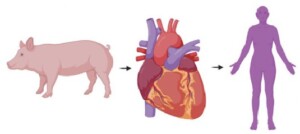On Friday, January 7, 2022, surgeons at the University of Maryland Medical center successfully performed the first pig to human heart transplant (Published before). On March 8, 60 days after his operation, the patient died.
The cause of death of the recipient of the first pig to human heart transplant was not clearly defined. Representatives of the institution did not offer many details on the cause of the patient’s death. Until day 45 or 50, he was doing very well, they said. Their comments seemed to downplay the unique nature of the implanted heart itself as a culprit and instead implicated the patient’s diminished overall clinical condition, in addition to a battle with infections. They said they were having difficulty maintaining a balance between his immunosuppression and controlling his infection. He went into multiple organ failure that may have resulted in his passing away.

The donor pig was genetically modified by knocking out three genes targeting specific porcine cell surface carbohydrates that provoke a strong human antibody response. This averted a hyperacute rejection response that would have caused the graft to fail almost immediately.
Other genetic manipulations, some using CRISPR technology, silenced genes encoding porcine endogenous retroviruses. Others were aimed at preventing thrombotic microangiopathy and excessive pig heart tissue growth. Six human genes responsible for immune acceptance were inserted.
The patient himself was treated with powerful immunosuppressants, including an investigational anti-CD40 monoclonal antibody that inhibits a well-recognized pathway critical to B-cell proliferation, T-cell activation, and antibody production.
Xenotransplantation is still promoted as a potential strategy for expanding the pool of organs available for transplantation. Researchers, however, prefer performing their experiments on brain-dead people. Researchers also prefer starting with xeno-kidney transplantation, since failure of transplanted kidney is not expected to kill the patient. Still, this last breakthrough surgery remains a landmark and takes the world one step closer to solving the organ shortage crisis.
For more, go to Medscape news, CNN, ABC news